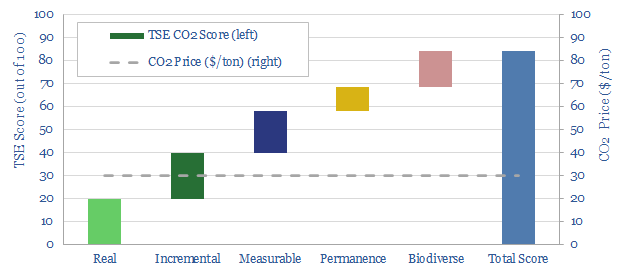TIST is the International Small Group and Tree Planting Program. It was founded in 1999. By late-2022, it has planted 23.6M+ living trees, coordinating the efforts of 137,700+ subsistence farmers, of whom c40% are women, sequestering 8M+ tons of CO2 across 40,000+ hectares of “degraded land”, mostly in Kenya and Uganda.
We scored TIST CO2 credits on our usual framework for assessing nature-based CO2 removals, deriving a relatively high score of 84/100.
The project scored highest on the categories of ‘realness’ and ‘additionality’. VERRA certification is a great help in de-risking that a project is real, as there are over 1,000 pages of independently verified documentation to wade through.
On additionality, Kenya has lost 12,000 ha of forest per year from 1990 to 2005, according to FAO. VERRA document clearly concludes that the project is reforesting degraded land, which would not be possible without a well-functioning carbon market.
On biodiversity and co-benefits, over 150 species of trees are found in the project area, and there are areas of high conservation value, including around national parks. For each $1, TIST has cited $8 of co-benefits for low-income farmers.
On permanence, this is possibly the area with most room for improvement on our CO2 assessment framework. Further details on TIST CO2 credits’ strengths and possible risk factors, are outlined in the data-file.
We made a $1,500 donation to the project, with CO2 credits costing $30/ton at the time of writing, to restore nature, provide fair income to subsistence farmer communities, and abate 50 tons of CO2. This is the third nature-based CO2 removal project we have supported this year, and the full list is here.

